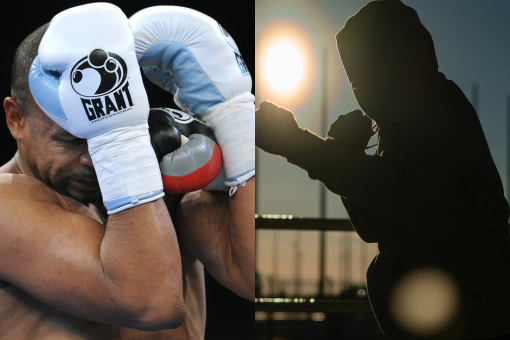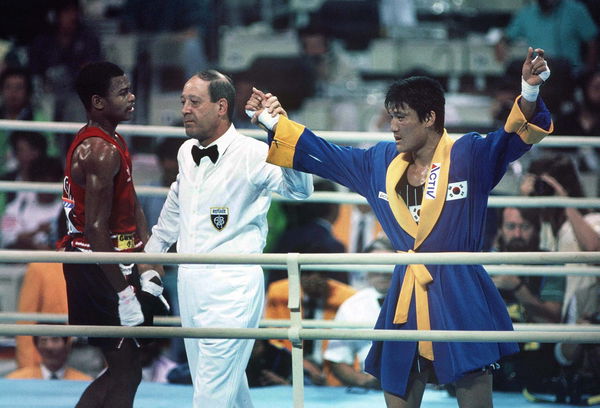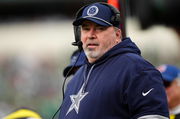
Imago
Roy Jones Jr. and Boxinf Silhouette/ Images from Imago

Imago
Roy Jones Jr. and Boxinf Silhouette/ Images from Imago
“The American won easily; so easily, in fact, that I was positive my four fellow judges would score the fight for the American by a wide margin. So I voted for the Korean to make the score only 4-1 for the American and not embarrass the host country.” These were the words of Hiouad Larbi, one of the five judges in the infamous Park Si-Hun vs Roy Jones Jr in the light-middleweight final of the Seoul 1988 Summer Olympics. However, contrary to his expectations, only two of the five judges voted in favor of the American. What happened in the match?
Watch What’s Trending Now!
American boxer Roy Jones Jr. dominated South Korea’s Park Si-Hun, landing 86 punches to Park’s 32. Three rounds: 20–3, 30–15, and 36–14. Two standing eight-counts should have cemented Jones’ win and Olympic gold. But the judges controversially awarded the Olympic gold to Park in a 3–2 split decision. Roughly 36 years later, the gold was returned to the deserving athlete. But in these three decades, Park suffered.
New York Post cited an AP report from 2020 reporting, “Park, on the other hand, felt ashamed by the victory and spiraled into a severe depression while fighting ‘suicidal urges’.” While Jones went on to have a great career, world titles in four different weight divisions, Park retired from the sport and declined opportunities to go pro and spent 13 years as a middle and high-school teacher before returning to boxing as a coach.
ADVERTISEMENT
In a 202o interview, Park confessed, “I didn’t want my hand to be raised (after the fight with Jones), but it did go up, and my life became gloomy because of that.” The Podium did not feel good. He smiled there weakly and slowly waved a bouquet toward the stands as fans let out hesitant cheers and scattered boos.

Imago
Bildnummer: 07829542 Datum: 02.10.1988 Copyright: imago/Colorsport
Pak Si-Hun (South Korea) is controversially declared the winner of the 71kg Boxing Final over Roy Jones (USA) in the Seoul Olympic Games, South Korea, 2/10/1988. PUBLICATIONxINxGERxSUIxAUTxHUNxPOLxUSAxONLY ; OS Sommerspiele Sommer Spiele 4 vdia xmk 1988 quer Olympics OLY88 o0 Südkorea Olympiasieg Sieg
Image number 07829542 date 02 10 1988 Copyright imago Color Sports Pak Si Hun South Korea is declared The WINNER of The 71kg Boxing Final Over Roy Jones USA in The Seoul Olympic Games South Korea 2 10 1988 PUBLICATIONxINxGERxSUIxAUTxHUNxPOLxUSAxONLY OS Summer Games Summer Games 4 Vdia xmk 1988 horizontal Olympics OLY88 o0 South Korea Olympic victory Victory
Almost 36 Years later, he has returned the gold. Park Si-Hun traveled to Roy Jones Jr.’s ranch in Pensacola, Florida, on May 30, 2023, under the disguise of an interview. And then, he presented Jones with that Olympic gold medal, saying through his son, “I had the gold medal, but I wanted to give it back to you. It belongs to you.”
ADVERTISEMENT
Jones smacked his forehead as he held the gold for the first time and said, “That is crazy.” A short video of the moment, directed by Emmy-winning filmmaker Johnny Sweet, has just been released.
But interestingly, this was not the only controversy in boxing during the 1988 Olympics.
ADVERTISEMENT
Another Olympic controversy from 1988 that turned ugly
When South Korean boxer Byun Jong-Il entered the ring during the 1988 Seoul Olympics to fight Bulgarian boxer Aleksandar Khristov in competition, the second round gave rise to one of the worst Olympic events. It was a normal fight until referee Keith Walker of New Zealand penalized Byun twice over repeated headbutting, which changed the tide and eventually earned Khristov a 4-1 decision victory.
Several men in the arena, as well as Byun himself, had the feeling that the punishment was too severe, and the tensions grew. Byun protested by staging a dramatic sit-in inside the ring, which lasted over an hour (67 minutes) when the decision was announced. The authorities also turned off the lights in the arena in a bid to make him go away, but he didn’t move, showing that he was not happy with the decision.
ADVERTISEMENT
The situation worsened when some South Korean boxing officials, coaches, and even a security officer burst into the ring and started fighting referee Keith Walker, punching and kicking him before things got under control. Response?
Top Stories
Paramount’s UFC Launch Under Fire After Kourtney Kardashian’s Husband Sparks Backlash

UFC 324 Payouts: How Much Will Justin Gaethje, Paddy Pimblett, Sean O’Malley, and Others Earn?

Pittsburgh Steelers Make Final Mike McCarthy Decision as Aaron Rodgers Gets His HC Wish

Sources: Bears Emerge as Suitors for Travis Etienne Jr., Chargers Expected to Cut Mekhi Becton, Toledo QB Not Focused on NFL

UFC 324 Walkout Songs: List of Entrance Music Used by Justin Gaethje, Paddy Pimblett, Sean O’Malley, and Others

Fans in Awe as Wholesome Blades Brown Moment Is Caught on Camera

Five South Korean officials were suspended by the International Amateur Boxing Association (AIBA), and Byun himself was banned from contesting internationally, while South Korea was temporarily banned from hosting boxing events.
ADVERTISEMENT
ADVERTISEMENT
ADVERTISEMENT